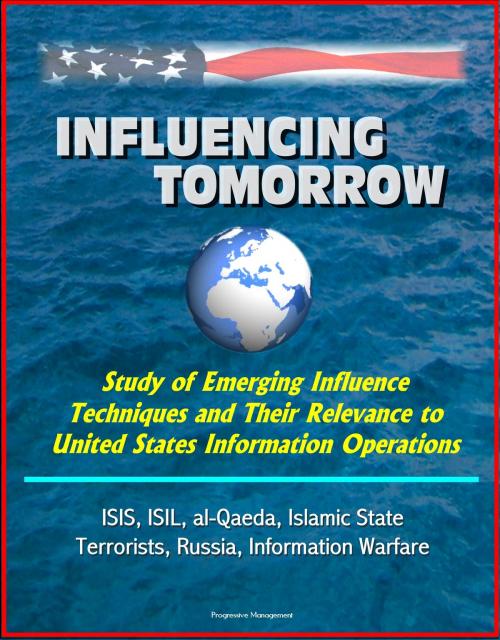Influencing Tomorrow: Study of Emerging Influence Techniques and Their Relevance to United States Information Operations - ISIS, ISIL, al-Qaeda, Islamic State, Terrorists, Russia, Information Warfare
Nonfiction, History, Military, Strategy, Social & Cultural Studies, Political Science| Author: | Progressive Management | ISBN: | 9781310207426 |
| Publisher: | Progressive Management | Publication: | January 28, 2016 |
| Imprint: | Smashwords Edition | Language: | English |
| Author: | Progressive Management |
| ISBN: | 9781310207426 |
| Publisher: | Progressive Management |
| Publication: | January 28, 2016 |
| Imprint: | Smashwords Edition |
| Language: | English |
Professionally converted for accurate flowing-text e-book format reproduction, this study examines emerging communications technologies and their usefulness to American information and psychological operations against enemies such as ISIS.
The development of a faster and more powerful internet combined with the wide spread proliferation of mobile cellular devices has fundamentally and profoundly revolutionized the way people communicate and share information with one another. Further advancements in mobile cellular technology has fueled widespread changes in the methods used to produce, record, share, and consume information. As a result, the information landscape of today is radically different than that of five or ten years earlier.2 These changes have forced individuals, organizations, and governments to re-examine and adapt the tools and techniques that they use to communicate, share information, and shape attitudes and beliefs. Information and influence professionals from both foreign governments, as well as violent extremist organizations (VEOs), have aggressively moved to leverage emerging technologies for the purpose of disseminating their ideology, recruiting supporters, and soliciting funding. Many emerging communications technologies have effectively lowered the barriers to entry for individuals and groups, and have diminished the historical competitive advantage large organizations and governments once enjoyed. The United States Information Operations and Psychological Operations communities within the Department of Defense must modify and evolve the technologies and methods currently used to conduct influence campaigns and counter hostile information operations activities. The failure of the United States (US) to adapt to this new environment could grant information dominance to adversary actors. Timely identification of relevant, emerging communications technologies, and the understanding of how to most effectively leverage them to achieve desired results, will prove critical to the United States in remaining effective in a rapidly changing communications landscape.
CHAPTER 1 * INTRODUCTION AND OVERVIEW * Primary Research Question * Secondary Research Questions * Assumptions * Definitions * Scope * Limitations * Delimitations * Conclusions * CHAPTER 2 * LITERATURE REVIEW * Introduction * The Modern Information Environment * Framing * Recruiting * Indoctrination * Mitigation * Exploitation * CHAPTER 3 * METHODOLOGY * Data Collection and Analysis Method * CHAPTER 4 * ANALYSIS * Al Qaeda Framing * Al Qaeda Recruiting * Al Qaeda Indoctrination * Al Qaeda Mitigation * Al Qaeda Exploitation * ISIL Framing * ISIL Recruiting * ISIL Indoctrination * ISIL Mitigation * ISIL Exploitation * Russian Framing * Russian Recruiting * Russian Indoctrination * Russian Mitigation * Russian Exploitation * CHAPTER 5 * CONCLUSIONS AND RECOMMENDATIONS * Conclusions * The New Information Environment * Al Qaeda Information Operations * ISIL Information Operations * Russian Federation Information Operations * Recommendations * Personalize the Narrative * Offer Compelling Alternative Media in low Competition Areas * Focus on the development of Influence Platforms not Products * BIBLIOGRAPHY
Professionally converted for accurate flowing-text e-book format reproduction, this study examines emerging communications technologies and their usefulness to American information and psychological operations against enemies such as ISIS.
The development of a faster and more powerful internet combined with the wide spread proliferation of mobile cellular devices has fundamentally and profoundly revolutionized the way people communicate and share information with one another. Further advancements in mobile cellular technology has fueled widespread changes in the methods used to produce, record, share, and consume information. As a result, the information landscape of today is radically different than that of five or ten years earlier.2 These changes have forced individuals, organizations, and governments to re-examine and adapt the tools and techniques that they use to communicate, share information, and shape attitudes and beliefs. Information and influence professionals from both foreign governments, as well as violent extremist organizations (VEOs), have aggressively moved to leverage emerging technologies for the purpose of disseminating their ideology, recruiting supporters, and soliciting funding. Many emerging communications technologies have effectively lowered the barriers to entry for individuals and groups, and have diminished the historical competitive advantage large organizations and governments once enjoyed. The United States Information Operations and Psychological Operations communities within the Department of Defense must modify and evolve the technologies and methods currently used to conduct influence campaigns and counter hostile information operations activities. The failure of the United States (US) to adapt to this new environment could grant information dominance to adversary actors. Timely identification of relevant, emerging communications technologies, and the understanding of how to most effectively leverage them to achieve desired results, will prove critical to the United States in remaining effective in a rapidly changing communications landscape.
CHAPTER 1 * INTRODUCTION AND OVERVIEW * Primary Research Question * Secondary Research Questions * Assumptions * Definitions * Scope * Limitations * Delimitations * Conclusions * CHAPTER 2 * LITERATURE REVIEW * Introduction * The Modern Information Environment * Framing * Recruiting * Indoctrination * Mitigation * Exploitation * CHAPTER 3 * METHODOLOGY * Data Collection and Analysis Method * CHAPTER 4 * ANALYSIS * Al Qaeda Framing * Al Qaeda Recruiting * Al Qaeda Indoctrination * Al Qaeda Mitigation * Al Qaeda Exploitation * ISIL Framing * ISIL Recruiting * ISIL Indoctrination * ISIL Mitigation * ISIL Exploitation * Russian Framing * Russian Recruiting * Russian Indoctrination * Russian Mitigation * Russian Exploitation * CHAPTER 5 * CONCLUSIONS AND RECOMMENDATIONS * Conclusions * The New Information Environment * Al Qaeda Information Operations * ISIL Information Operations * Russian Federation Information Operations * Recommendations * Personalize the Narrative * Offer Compelling Alternative Media in low Competition Areas * Focus on the development of Influence Platforms not Products * BIBLIOGRAPHY















